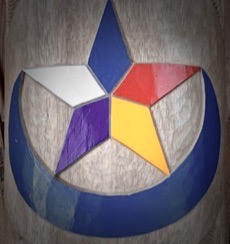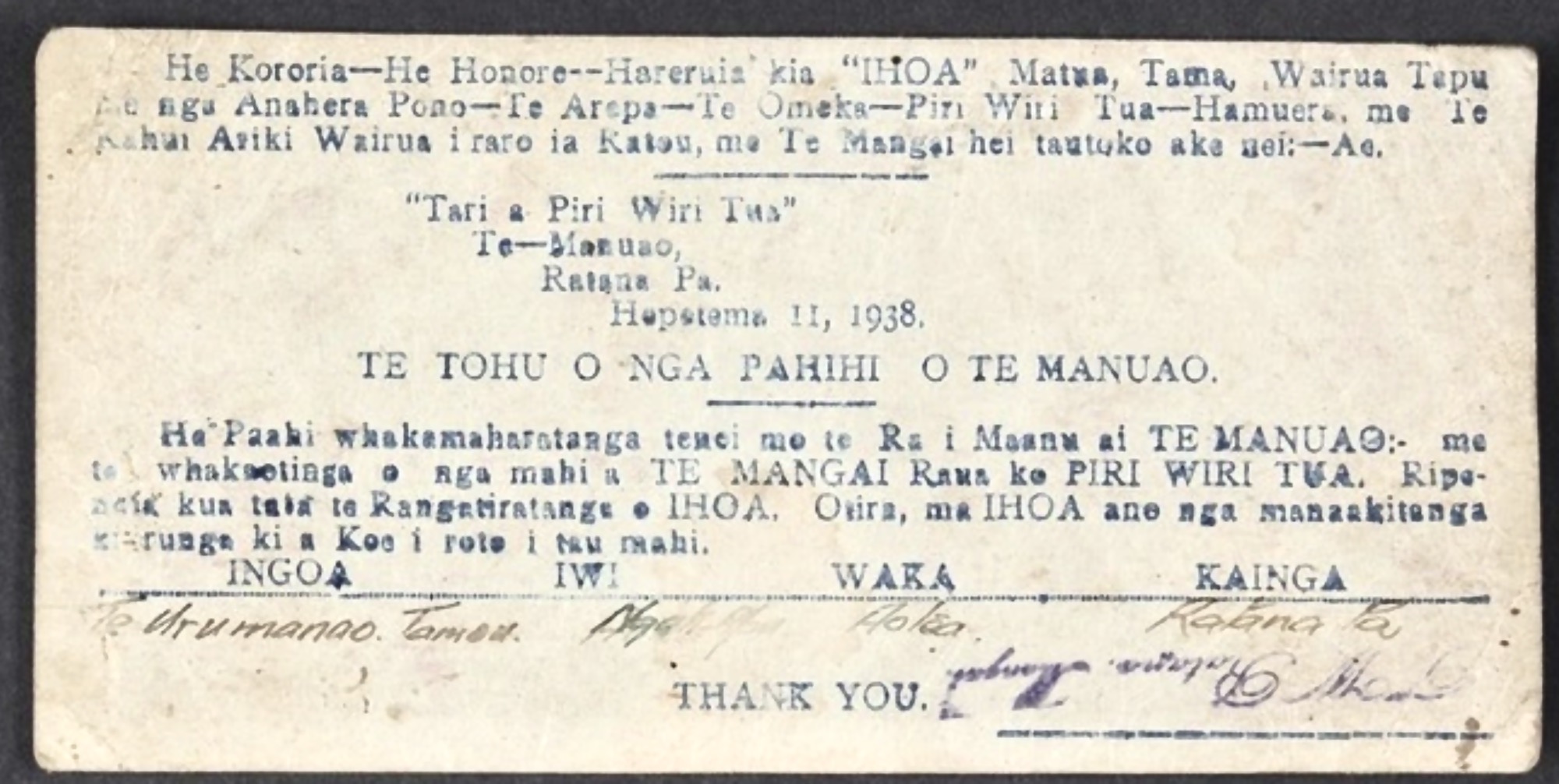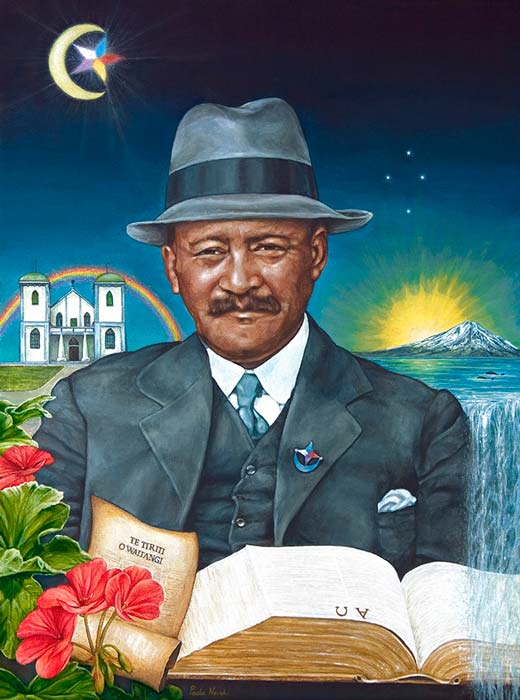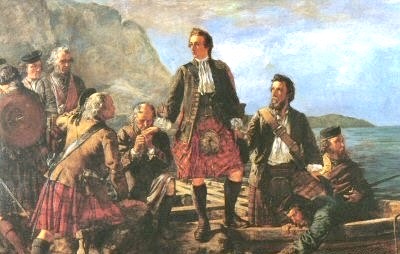KARA*KIA

Ratana Hymn
|
NEW
ZEALAND KARA*KIA |

|
He Koraria
Hareruia Ratana Hymn |
|
Maori songs - Kiwi
songs - Home
This hymn expresses the fundamental beliefs of the trans-tribal Maori spiritual and political movement founded after WW1 by a Methodist farmer, T. W. Ratana. Word
for word translation
Explanatory translation

1a. Mangai - T W Ratana
is seen as a Mouthpiece or prophet of Jehovah, with the
ability to use the messages of stories in the Bible to assist
the situation of Maori at the present time. Just as
Philistines had conquered the fertile coastal lands of the
Jews, so too had British colonists conquered the most fertile
lands of Maori. By following God's commandments again, the
Jews became strong enough to regain their lands. So too would
the Maori.
1b. Piri Wiri Tua - T W Ratana was also a political activist. Samuel had put pressure on the local ruler to get Israel back for the Jews, and similarly Mr Ratana put pressure on the NZ government. 2. Te Arepa, Te Omeka is from the Bible. I
am Alpha and Omega, the beginning and the ending, says the
Lord; which is, which was, and which is to come...
(Revelation 1:8)
Alpha and Omega are the first
and last letters in the Greek alphabet, and the Greek language
was much-used at the time of Christ. (O-mega, or big-O, has a
longer sound than little-O, or O-micron)
 3.
Hamuera - TW Ratana
practiced spiritual healing, or psychological re-birthing, for
those with feelings of depression or guilt, similar to
what trained tohungas had been practicing for hundreds of
years, often aided with herbal supplements, as described in
the moteatea Pinepine
Te Kura.
From about the 1880s to the 1920s, false "tohunga" used karakia kikokiko to extract money from desperate Maori in the dark times before the new Pakeha diseases could be prevented by vaccination. "I
hira ake ta ratou mana i to nga rangitira o nga hapu; a, i
te matututanga o te mate, i hewa nga turoro na nga karakia
kikokiko i ora ai." Te
Korimako, 15th June, 1882
"Their mana is greater than that of the chiefs of the kinship groups, and, when convalescing, the patients are deluded into thinking that the malevolent ritual chants will heal them." He countered the influence of the con-men by showing people how to utilise the power of the Holy Spirit within themselves, and he collected up all the taiaha, god-sticks and pounamu stage-props used by various charlatans. Ratana and his followers kept applying pressure on the government, just like Samuel had done, until Tohunga-ism was destroyed, just like the Philistines were. This became famous as the Hamuera victory. TahupÅtiki Wiremu Ratana, Ngati Apa , Nga Rauru.  Born
near Bulls in 1873, he
was raised in a whangai family as a Methodist, and worked as a
farmer. At the end of WW1, when thousands were dying in the
'Flu pandemic, he had a vision of the Holy Spirit coming to
him. His reputation spread rapidly, and a village grew where
he lived, midway between Whanganui and Marton, becoming known
as Ratana pa. Born
near Bulls in 1873, he
was raised in a whangai family as a Methodist, and worked as a
farmer. At the end of WW1, when thousands were dying in the
'Flu pandemic, he had a vision of the Holy Spirit coming to
him. His reputation spread rapidly, and a village grew where
he lived, midway between Whanganui and Marton, becoming known
as Ratana pa. In 1921 and 1922 he traveled throughout New Zealand. Thousands attended his meetings, and many became his followers. The Ratana religious movement became more organised and political, and members began publishing a newspaper. Ratana's movement gave new hope and a trans-tribal unity to Maori, who had many grievances against the New Zealand government. By 1920 they had lost most of their lands and had been devastated by disease and by the adverse moral effects of World War I. A subject of particular bitterness was the failure of the government to fulfill its several promises to the Maori in the Treaty of Waitangi (1840). In 1924 Ratana took a petition to London and the League of Nations, signed by more than 30,000 Maori,calling for the return of. confiscated lands, and implementation of the Treaty of Waitangi. The journey was fruitless, but did help persuade the New Zealand government, in 1926, to set up a commission of inquiry to investigate land confiscation, and it later upheld many Maori grievances over land. By 1925 the self-proclaimed Ratana church had developed a syncretic Maori Christianity, marked by hymns and prayers that glorified Ratana as God's mouthpiece. Combining political activism with its religious beliefs, the Ratana church began to sponsor political candidates, and in 1931 a Ratana candidate was elected, and the church's allying itself with the country's Labour Party established a position in which it could exercise some political power. At an historic meeting in 1936 he presented the Labour leader, Michael Joseph Savage, with gifts symbolising the partnership between Ratana and Labour. By 1943 all four Labour seats were held by the Ratana/Labour alliance. Ratana died in 1939. Bring Back My Bonnie  This
waiata is symbolically sung to the tune of My Bonnie lies
over the ocean...Bring back my Bonnie to me...
a Scottish folk song composed about "Bonnie Prince Charlie"
Stuart who tried to return Scotland to the Scottish Stewart
rule, instead of the iron-fisted German Hanover one, but
failed and had to flee to France. Similarly the Ratana
movement has helped to bring some Maori rule back to Aotearoa. This
waiata is symbolically sung to the tune of My Bonnie lies
over the ocean...Bring back my Bonnie to me...
a Scottish folk song composed about "Bonnie Prince Charlie"
Stuart who tried to return Scotland to the Scottish Stewart
rule, instead of the iron-fisted German Hanover one, but
failed and had to flee to France. Similarly the Ratana
movement has helped to bring some Maori rule back to Aotearoa. Have a look at the Ratana song
Te
Whetu Marama.
And the Te Iwi, te Iwi... verses in Po Atarau Also the moral re-armament song Tutira Mai Nga Iwi
Put onto folksong.org.nz website for Matua Hiroti March
2023 |